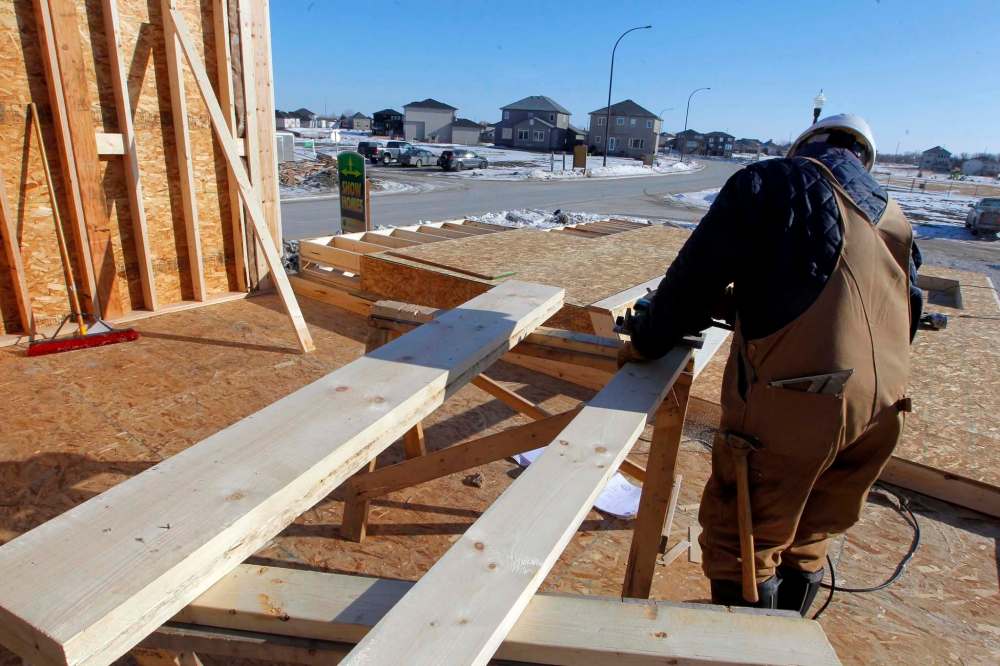Busiest year for homebuilders since ’80s
Rush to avoid impact fees linked to banner 2017
Advertisement
Read this article for free:
or
Already have an account? Log in here »
To continue reading, please subscribe:
Monthly Digital Subscription
$0 for the first 4 weeks*
- Enjoy unlimited reading on winnipegfreepress.com
- Read the E-Edition, our digital replica newspaper
- Access News Break, our award-winning app
- Play interactive puzzles
*No charge for 4 weeks then price increases to the regular rate of $19.00 plus GST every four weeks. Offer available to new and qualified returning subscribers only. Cancel any time.
Monthly Digital Subscription
$4.75/week*
- Enjoy unlimited reading on winnipegfreepress.com
- Read the E-Edition, our digital replica newspaper
- Access News Break, our award-winning app
- Play interactive puzzles
*Billed as $19 plus GST every four weeks. Cancel any time.
To continue reading, please subscribe:
Add Free Press access to your Brandon Sun subscription for only an additional
$1 for the first 4 weeks*
*Your next subscription payment will increase by $1.00 and you will be charged $16.99 plus GST for four weeks. After four weeks, your payment will increase to $23.99 plus GST every four weeks.
Read unlimited articles for free today:
or
Already have an account? Log in here »
Hey there, time traveller!
This article was published 10/01/2018 (2861 days ago), so information in it may no longer be current.
Homebuilders raced to get Winnipeg projects into the ground before the beginning of the new year to avoid paying the city’s new impact fee and the result was the busiest year for Winnipeg homebuilders since the late-1980s.
In its year-end preliminary housing start data, Canada Mortgage and Housing Corp. (CMHC) said solid population gains, a stable economy and good employment growth in the city helped generate 5,024 new starts in the city of Winnipeg proper in 2017 — a 39.3 per cent increase from the year before.
But Heather Bowyer, CMHC’s senior market analyst for Manitoba, said, “In talking with homebuilders and our colleagues, one of the primary reasons why we have seen such a growth in housing starts this year is that there has been a push forward in housing starts.”

Last year, the city introduced a growth or impact fee on new residential projects in new and emerging areas of the city.
The fee of $5 per square foot will add about $9,200 to the cost of a new 1,800-square-foot home in the designated areas. But if builders secured their permit before May 1, 2017, and were in the ground by Jan. 1, 2018, they would be exempt from the fee. The city had originally set the in-the-ground deadline for Nov. 1, but extended it to the end of the year.
Lanny McInnes, president of Manitoba Home Builders Association, said the extension was much appreciated.
“Our builders were really ramping up activity over the summer to make sure they could meet those deadlines,” McInnes said. “It was a little trickier for multi-family projects. So we were happy to see the city move on that (extending the deferment). We had quietly asked them to consider it. We were pleased they took that request into consideration.”
The frantic pace going down to the wire meant December housing starts in Winnipeg were 119 per cent ahead of the numbers from December 2016.
Only St. John, N.B., and Peterborough, Ont., had larger year-over-year increases in December.
On a year-over-year basis, total actual housing starts more than doubled in December compared to December 2016, with the multi-family sector leading this increase, particularly new apartment projects. Single-detached starts also witnessed strong year-over-year growth.
Province-wide, there were 574 housing starts in December, a 127 per cent increase over December 2016, the largest increase by far of any province, not including P.E.I., where there were only 39 starts in total.
McInnes said there was an understanding that 2017 was going to be a very busy year and that the timing of projects was going to be affected by the impact fee.
“It was nice to see starts being so strong in December,” McInnes said.
“It gives us a reason to be optimistic heading into 2018.”
Having said that, there is also a general understanding that 2018 will not be quite as strong.
“With that big level of construction we saw this year, we expect a bit of a pull back as the market adjusts to those higher levels,” Bowyer said.
“Because these starts were pushed ahead (to beat the impact fee) we will see a bit of a pull back from that in the following years.”
However, favourable housing markets are expected in the coming year in Winnipeg, with balanced market conditions for the resale market and no price accelerations on the horizon, according to Bowyer. Growing numbers of first-time buyers are expected in the 25 to 34 age group along with wage growth and stable employment trends.
McInnes agrees that it is not likely that 2018 will generate the same kind of numbers as the year that just concluded, but he said starts are projected to remain at or above 2015 and 2016 levels, which were themselves relatively strong rebound years.
He said it’s still too early to judge what effect the impact fees will have on the market going forward.
“In 2018 we’ll see if the market starts looking at surrounding municipalities around Winnipeg or if homeowners will think of it (the impact fee) as just an additional fee that — over the long term of home ownership or the term of a mortgage — will just be included in the overall cost of their budgeting.”
martin.cash@freepress.mb.ca
History
Updated on Wednesday, January 10, 2018 7:59 AM CST: Adds photo

